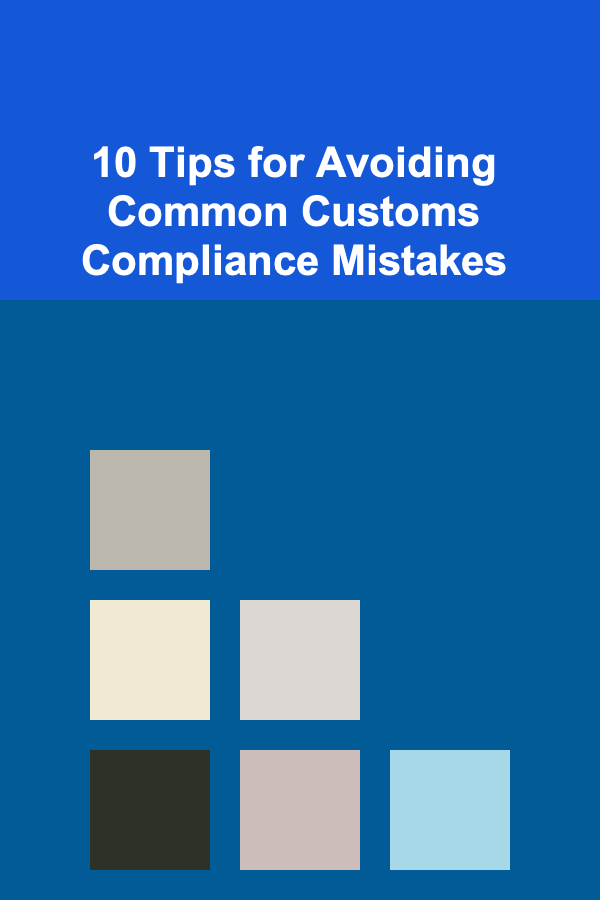
10 Tips for Avoiding Common Customs Compliance Mistakes
ebook include PDF & Audio bundle (Micro Guide)
$12.99$10.99
Limited Time Offer! Order within the next:

Customs compliance is a critical aspect of international trade that many businesses overlook. Failure to adhere to customs regulations can result in costly fines, delays, or even the seizure of goods. Proper compliance ensures smooth operations, protects your business from legal troubles, and helps maintain a positive relationship with customs authorities.
In this article, we will explore 10 essential tips for avoiding common customs compliance mistakes, ensuring that your business stays on track and operates within the boundaries of international trade laws.
Understand the Regulations and Requirements of Each Country
One of the most common mistakes businesses make when dealing with customs compliance is assuming that the same rules apply everywhere. Each country has its own set of regulations, tariffs, and procedures for importing and exporting goods. These regulations can vary greatly depending on the type of product, its origin, and its destination.
Why it's important:
- Different countries impose different duties, taxes, and restrictions on imported goods.
- Misunderstanding local regulations can result in penalties, delays, or the denial of entry for your goods.
How to avoid the mistake:
- Research the specific customs requirements for each country where you do business.
- Stay updated on any changes to the customs laws and regulations in both your country and the destination country.
- Work with a customs broker or trade expert who understands the intricacies of each country's customs procedures.
Classify Goods Correctly
One of the most crucial steps in customs compliance is correctly classifying the goods being imported or exported. This classification determines the tariffs and taxes that will be applied to the goods. Incorrect classification can lead to fines, delays, and underpayment or overpayment of duties.
Why it's important:
- The Harmonized System (HS) code assigned to a product directly impacts the customs duties, taxes, and import restrictions that apply.
- Misclassification can result in paying too much or too little in customs duties, which may lead to legal and financial consequences.
How to avoid the mistake:
- Ensure that your products are correctly classified according to the HS code system.
- Use detailed product descriptions and consult with a customs expert to verify the correct classification.
- When in doubt, request a binding ruling from the relevant customs authority to clarify how your products should be classified.
Ensure Accurate Valuation of Goods
Customs duties are often calculated based on the value of the goods being imported or exported. Incorrect valuation can lead to paying less than the required duty, which could result in penalties or audits. On the other hand, overestimating the value could lead to unnecessarily high duties.
Why it's important:
- Customs authorities will assess the declared value of goods and may challenge under- or over-valuations.
- Accurate valuation is essential for compliance with customs regulations and to avoid fines.
How to avoid the mistake:
- Use reliable and verifiable methods to determine the value of the goods, including the invoice price, transportation costs, and any other relevant factors.
- Keep accurate records of all transaction details, including costs, to provide evidence if questioned by customs officials.
- Avoid undervaluing or overvaluing your goods to minimize the risk of penalties.
Properly Document Shipments
Another critical aspect of customs compliance is maintaining proper documentation for each shipment. Failure to provide the required documents can delay shipments, lead to fines, or result in the seizure of goods.
Why it's important:
- Customs authorities rely on the accuracy and completeness of documents to assess whether goods comply with import/export regulations.
- Incomplete or incorrect documentation can lead to significant delays, fines, or even the confiscation of goods.
How to avoid the mistake:
- Ensure that all required documents are complete and accurate. Common documents include commercial invoices, bills of lading, certificates of origin, and import/export permits.
- Keep records of all documents related to your shipments for a minimum of five years, as required by most customs authorities.
- Double-check that all documents are properly signed, dated, and include the correct information.
Know the Duty Rates and Tariffs
One of the most significant expenses associated with international trade is customs duties and tariffs. Failing to understand the applicable duty rates for your goods can result in higher-than-expected costs or fines.
Why it's important:
- Different products and countries have different duty rates and tariffs, and failing to account for these can lead to incorrect payments and penalties.
- Duty rates can change over time, and staying unaware of these changes can affect your cost structure.
How to avoid the mistake:
- Research the duty rates and tariffs for each of your products, including any special duty programs or exemptions that may apply.
- Stay updated on changes in duty rates and tariffs, particularly if you're involved in trade agreements that may affect the rates.
- Work with a customs broker to ensure that the correct duty rate is applied.
Comply with Import and Export Restrictions
Every country has its own import and export restrictions, which may be imposed for reasons of national security, public health, or foreign policy. Violating these restrictions can lead to serious consequences, including fines or the suspension of your business's ability to trade internationally.
Why it's important:
- Some goods are subject to bans, quotas, or additional licensing requirements.
- Ignoring these restrictions can lead to severe penalties, including the seizure of goods and blacklisting of your company.
How to avoid the mistake:
- Always check the import and export restrictions for both the country you're exporting from and the country you're importing into.
- Ensure that your products comply with the regulations regarding controlled or restricted items, such as pharmaceuticals, chemicals, or dual-use technologies.
- Obtain all necessary licenses or permits before attempting to import or export restricted goods.
Stay Up-to-Date with Free Trade Agreements (FTAs)
Free trade agreements (FTAs) are treaties between countries that reduce or eliminate tariffs and trade barriers on certain goods. Not taking advantage of FTAs can result in unnecessarily high costs for your business.
Why it's important:
- FTAs can provide substantial savings by reducing or eliminating tariffs.
- Failing to apply for preferential treatment under an FTA can increase your costs and make your goods less competitive in the international market.
How to avoid the mistake:
- Familiarize yourself with the FTAs that your country has with its trading partners.
- Ensure that your products meet the criteria for preferential treatment under the relevant FTAs.
- Keep accurate records of the origin of your goods to demonstrate their eligibility for FTA benefits.
Be Mindful of Product Labels and Markings
Incorrect or missing labeling is a common customs compliance mistake. Most countries have specific requirements for the labeling of imported goods, including product descriptions, country of origin, and compliance with safety standards.
Why it's important:
- Incorrect labeling can result in goods being rejected at the border, delayed, or destroyed.
- Failing to label goods according to regulations can also result in fines or the seizure of the products.
How to avoid the mistake:
- Ensure that your products are labeled correctly according to the regulations of the importing country.
- Include the required information on the labels, such as the country of origin, product description, and compliance with safety standards.
- Verify that the labels are clear, legible, and meet the local language requirements.
Avoid Miscommunication with Customs Brokers
Customs brokers play a vital role in ensuring that your shipments comply with customs regulations. However, miscommunication with your broker can lead to costly mistakes, delays, or missed deadlines.
Why it's important:
- A customs broker acts as your representative in dealing with customs authorities, and any miscommunication can lead to compliance failures.
- Delays or errors in documentation can result in fines or rejected shipments.
How to avoid the mistake:
- Clearly communicate your expectations and provide all relevant information to your customs broker.
- Maintain regular contact with your broker and ensure that they have all the necessary documentation.
- Establish a clear process for handling any issues that may arise during the shipment process.
Monitor Your Compliance Performance Regularly
Customs compliance is not a one-time task; it's an ongoing process that requires regular monitoring and audits. Failure to review your compliance practices regularly can lead to missed errors, increasing the risk of non-compliance.
Why it's important:
- Regular monitoring helps identify any potential compliance issues before they become major problems.
- It ensures that your business continues to follow the ever-changing customs regulations.
How to avoid the mistake:
- Conduct regular internal audits of your customs compliance processes to ensure they are up-to-date and effective.
- Work with external consultants or experts to conduct periodic reviews of your compliance practices.
- Implement a compliance management system to help track and manage your customs activities.
By following these 10 tips, your business can avoid common customs compliance mistakes and ensure smooth international trade operations. Maintaining a strong focus on customs requirements not only helps you avoid penalties and fines but also builds a solid foundation for successful international expansion.
Reading More From Our Other Websites
- [Tie-Dyeing Tip 101] From Canvas to Cotton: Paintbrush Techniques for Vibrant Tie-Dye
- [Whitewater Rafting Tip 101] White-Water Wonders: Top 10 Must-Visit Rivers for Thrilling Rafting Adventures
- [Trail Running Tip 101] Exploring Nature Together: The Best Trail Running Destinations for Groups
- [Organization Tip 101] How to Use Pinterest to Curate Your Favorite Recipes
- [Home Cleaning 101] How to Maintain a Clean and Fresh Home When You Have Pets
- [Home Holiday Decoration 101] How to Choose the Best Holiday Decor for Small Apartments
- [Home Budget Decorating 101] How to Use Decorating with Fabric Scraps for High-Impact, Low-Cost Home Upgrades
- [Organization Tip 101] What Are the Best Tools for Organizing a Home Workshop?
- [Reading Habit Tip 101] Creative Book Swaps: Building a Community of Free Readers
- [Organization Tip 101] How to Teach Kids Organization Skills Through Games

How to Use Plants to Improve Air Quality and Aesthetics
Read More
Revolutionize Your Routine with These Reusable and Eco-Friendly Alternatives
Read More
Why Organizing Your Home Can Boost Your Mental Health
Read More
How to Attract Hummingbirds to Your Garden
Read More
Designing Custom Footwear for Print-on-Demand: A Comprehensive Guide
Read More
How to Balance Your Macronutrients for Optimal Energy
Read MoreOther Products

How to Use Plants to Improve Air Quality and Aesthetics
Read More
Revolutionize Your Routine with These Reusable and Eco-Friendly Alternatives
Read More
Why Organizing Your Home Can Boost Your Mental Health
Read More
How to Attract Hummingbirds to Your Garden
Read More
Designing Custom Footwear for Print-on-Demand: A Comprehensive Guide
Read More